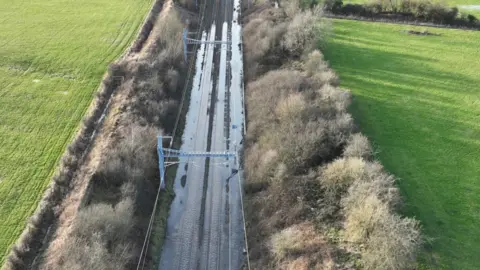Rail users warned of delays as flood work begins
 Network Rail
Network RailRail passengers are being urged to plan ahead as the latest stage of flood prevention work begins between Swindon and Bristol Parkway.
Network Rail said work will take place "around the clock" in and around the Chipping Sodbury tunnel until Sunday.
Network Rail project manager George Barratt said the work will "help improve reliability and make the railway more resilient".
During the work, the railway will be closed between Swindon and Bristol Parkway, with trains diverting via Chippenham and Bath, so taking longer than usual.
The Chipping Sodbury tunnel, to the north of Bristol, was built in 1901 and is prone to flooding during wet weather.
A lagoon was installed in 2018 as part of a flood alleviation scheme designed to improve the resilience of the railway line.
Network Rail is working alongside the Environment Agency, South Gloucestershire Council, the Farming and Wildlife Advisory Group and Wessex Water to find long-term solutions to flooding.
The project will see 200m (656ft) of track raised by 20cm (7.8in) at the western end of the tunnel with overhead cables adjusted accordingly.
Drainage channels will also be dredged throughout the tunnel to allow more water to be collected.
Two water removal pumps are being replaced at the western end of the tunnel, and surveys and design work carried out for future replacement of two pumps at the eastern end of the tunnel.
GWR station manager for Bristol Parkway Marcus Deegan said the work is the latest in a wider scheme to "ease the effect of flooding on the railway and in the surrounding area".
During the work, there will be fewer services between south Wales and London, with that route also affected by longer journey times on 20 July due to follow up work.
Between now and Sunday, additional peak-time trains will run between London Paddington and Swindon.
During the works, passengers should check journeys in advance, Mr Barratt said.
An ongoing battle
The current work should enable trains to continue operating for longer during periods of heavy rain and will shorten the length of any closures that do need to take place.
Services across the GWR network have been significantly disrupted by flooding in recent years and is an issue that the company believes will continue reoccurring.
"This is definitely a project to make the line more future-proof," said Mr Barratt.
"We're not necessarily trying to stop flooding, we're trying to keep passengers and freight moving more often.
It's safe to say that this is an effect of climate change - we are experiencing wetter winters and drier and wetter summers.
It's an ongoing battle that we have to face and we're working not just on this section of railway but thinking how we can keep passengers moving between major stations," he added.
Mr Barratt also says that GWR are also working with the Environment Agency, local authorities and wildlife groups to limit the impact of flooding in the wider area.
Follow BBC Bristol on Facebook, X and Instagram. Send your story ideas to us on email or via WhatsApp on 0800 313 4630.
